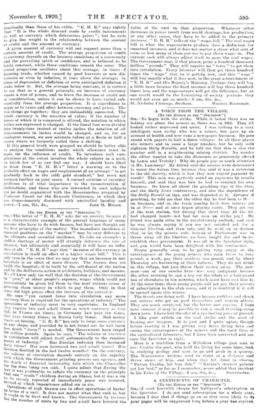[To THE EDITOR OF THE " SPECFATOR."] Ste,—The letter of
" E. H. B." asks for an answer, because it is a characteristic example of the general language of many persons who have to do with finance, but have not thought out the first principles of the matter. The immediate incidence of financial positions on the "market" may be very different to the ultimate and essential incidence. To take an example: a sudden shortage of money will strongly influence the rate of interest, but ultimately and essentially it will have no influ- ence at all. "13. H. B." says that " increase of the currency in circulation is itself an effect of a higher wages bill." This is only true in the sense that we may say that an increase in our hospitals is an effect of more disease. The disease does not build the hospital; it. is built by the self-denial of the nation and by the deliberate action of architects, builders, and masons. We all know only too well that the decision of the Government to "give," at other people's expense, wages which could not economically be given led them to the next ruinous error of Printing sham money in which to pay them. Only in that senec did high prices effect the increase of the currency.
Ile says "you cannot force into circulation any more currency than is required for the operations of industry." The operations of industry must he very capricious. In England they require two and a-half times as muelt currency as they did; in France six times; in Germany last year lets times, this year twenty times; in Russia forty times. Bad money wants no forcing. "E. 11. B." has only to forge some currency in say shape, and provided he is not found out he will learn llow much "force" is needed. The Government have forged a million pounds. Again lie says, "The volume of currency in circulation will adjust itself automatically to the require- nests of industry." Has Russian industry then increased fortY times? Has ours increased two and a-half times? Ilas German doubled in the last twelve months? On the contrary, tilC volume of circulation depends entirely on the rapidity with which the Government printing presses ean operule, and thC depth of financial immorality into which the Chancellor for the time being can sink. I quite admit that during the war it was preferable to inflate the currency on the principle that one " spoils" children during an illness, but it was a sin lo be sternly repented of immediately peace was restored, ingtead of which impenitence added sin to sin. Operations of high finance are in effect operations of barter In terms of a unit. It does not matter what that unit is, but it "'LOA to be fixed and known. The Government by inereas- th
the number of units by two and a-half have lowered the
value of the unit in that proportion. Whatever other increases in prices result from world shortage, low production, or any other cause, they have to he added to the printery increase. " E. H. B." talks of the " wages hill." The real waged bill is what the wage-earners produce (less a deduction for unearned incomes), and it does not matter is straw what sort of coins or how many of them you use to pay those wages in. The current cash will always adjust itself to meet the real wages. The Government may, if they please, print a hundred thousand million " pounds." They will require no " force" to get them into circulation. Every labourer will then get three hundred dines the " wage" that he is getting now, and this " wage " will buy exactly what it does now, to the great astonishment of " E. 11.11." and His Majesty's Ministry. Perhaps they will buy a little more because the fixed incomes will buy three hundred times less, and the wage-earners will get the difference, but as one result would he the Leniniting of society perhaps they would not even got as muck.—I am, Sir, Ac., St. Nicholas Vicarage, Durham.. WESTLEY BUTHAMLEY.






































 Previous page
Previous page